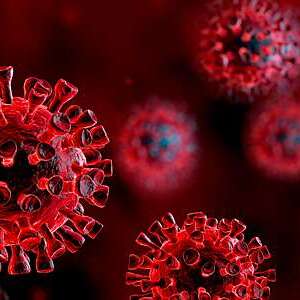The chief infectious disease specialist of the Ministry of Health called the differences of "omicron"

The omicron CORONAVIRUS strain is highly contagious (contagious. -), so it has a chance to spread very quickly and infect a large number of people. In this characteristic, it differs from previous strains, Vladimir Chulanov, chief freelance specialist in infectious diseases of the Ministry of Health, said in an interview with RBC.
If the contagiousness of the virus is low, then the incidence increases gradually, Chulanov explains, in the case of the “omicron”, the time to reach the peak value in terms of the number of cases may be shorter. At the peak, due to the absolute number of cases at the same time, the healthcare system can be overloaded, he concluded.
“Lethality (the proportion of deaths among the sick. - RBC) may be lower. But mortality may increase, and it will depend on the number of cases at the same time. <...> You can’t treat “omicron” in the spirit of “well, just think, it’s not scary to get sick.” It is important to vaccinate and revaccinate six months later,” he says.
Chulanov - RBC: It is naive to think that the evolution of covid will stop on the omicron Society
Despite the fact that the healthcare system allows for the rapid deployment of beds over the two-year period of the pandemic, “there is no need to test its strength,” urged the chief infectious disease specialist of the Ministry of Health.
Read together with it:
- Scientists have discovered a new virus, Salt Gully, in bats.The virus was found in flying foxes and bat samples from 2011. it is circulating in nature, but it is not yet possible to predict whether the pathogen will be transmitted to humans or whether there will be outbreaks, the expert warned.Scientists have discovered a new bat-borne virus in flying foxes living in Australia, The Telegraph reports. It has been namedSALT Gully. Jennifer Barr, an expert at...
- Poland's former health minister was beaten for his policies during the COVID-19 pandemic.Adam Niedzielski PhotoREUTERS , August 29, MINSK . Former Polish HEALTH Minister Adam Niedzielski was beaten for decisions he made during the CORONAVIRUS pandemic, RMF24 reports. The former Polish minister was beaten by two men outside a restaurant in the Polish city of Siedlce. At the time of the attack, the assailants were loudly criticizing Niedzielski's decisions during the coronavirus pandemi...
- Бывшего польского министра избили за политику при COVIDАдама Недзельского избили двое мужчин возле ресторана в Седльце, критикуя его решения во время пандемии. Бывший министр связал их действия с лишением защиты и «терпимостью к разжиганию ненависти» Адам Недзельский Бывшего польского министра здравоохранения Адама Недзельского избили около ресторана в городе Седльце. На экс-министра напали двое мужчин. Об этом сообщила радиостанция RMF24 со ссылкой н...
- Infectious disease specialists see the need for urgent measures due to meningococcusIn RUSSIA, more than 1,200 cases of meningococcal infection have been recorded since the beginning of the year, compared to no more than 600 for the entire previous year. Against this backdrop, doctors have proposed introducing vaccinations for residents.Russia needs to take urgent action due to the sharp rise in meningococcal infections, especially among vulnerable population groups. Doctors and ...
- Consequences of heat. Since July 3, 10 children and 18 adults have sought medical attention for heat strokes8 July, MINSK . Doctors are registering the first victims of heat injuries, BELTA reports citing the Ministry of HEALTH . According to the Republican Center for Medical Response of the Ministry of Health, since 3 July, 28 people have sought medical help with heat strokes, five of whom have been hospitalized. Ten children and 18 adults have suffered from the effects of the hot weather. The Ministry...
- The UN announced a historic minimum birth rate in the worldBirth rates in many countries around the world have reached record lows, according to a new report from the United Nations Population Fund (UNFPA). One in five respondents admitted that they cannot have as many children as they would like, mainly due to the high cost of living and financial difficulties. UNFPA conducted a study among 14,......
- The US has lifted the COVID-19 vaccine recommendation for pregnant women and children.The US Department of HEALTH and Human Services is rescinding the Centers for Disease Control and Prevention's (CDC, a federal agency) recommendation for CORONAVIRUS vaccination for healthy pregnant women and children, US Secretary of Health and Human Services Robert F.Kennedy Jr. on social media X. “I couldn’t be happier than to announce that as of today, the vaccine against"COVID for healthy chil...
- Here, they say "no" to low-quality and defective products. What is the journey that products take to reach supermarket shelves?it 's a well-known fact that food security in our country is in perfect order. Today, Belarusians produce at least 70% of their food needs, thereby providing themselves with tasty, high-quality, and healthy food and beverages, leaving reserves for significant exports, maintaining their position as a major global food supplier. Last year, for example, Belarus exported food products to 117 countries...
- Here, they say "no" to low-quality and defective products. What is the journey that products take to reach supermarket shelves?it 's a well-known fact that food security in our country is in perfect order. Today, Belarusians produce at least 70% of their food needs, thereby providing themselves with tasty, high-quality, and healthy food and beverages, leaving reserves for significant exports, maintaining their position as a major global food supplier. Last year, for example, Belarus exported food products to 117 countries...
- Lev Leshchenko's representative responded to rumors about the singer's "rare illness."Lev LeshchenkoPeople's Artist of the RSFSR Lev Leshchenko is feeling well, his representative told an RBC correspondent. Earlier, the TELEGRAM channel Mash reported that the 83-year-old artist had been diagnosed with a "rare disease," but its progression was halted with expensive medications funded by the state. According to Mash, Leshchenko was forced to cancel his concerts in the Far East due to...






























































